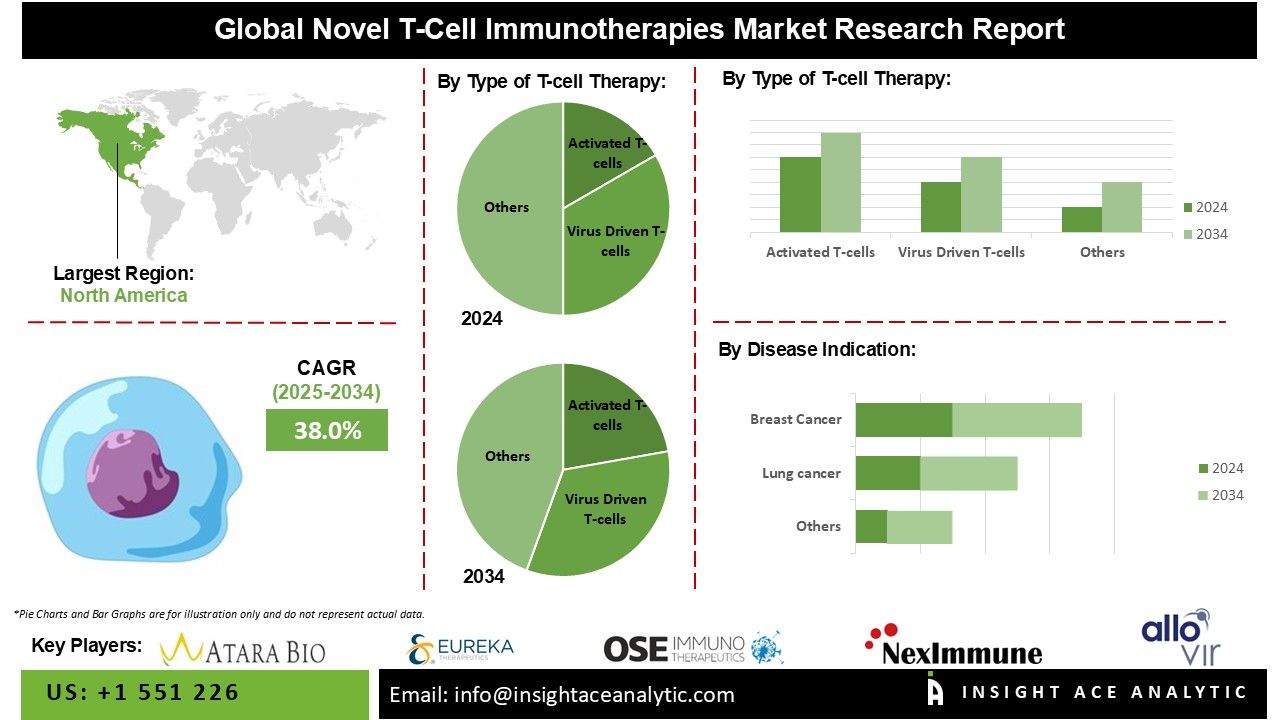Global Novel T-Cell Immunotherapies Market is expected to grow at a 38.0% CAGR during the forecast period for 2025-2034.
Novel T-Cell Immunotherapies Market Size, Share & Trends Analysis Report By Type of T-cell Therapy (Activated T-cells, Virus Driven T-cells, Tregs, ?? T-cells, T-cell vaccines, and NK T-cells), By Disease Indication, Region, And Segment Forecasts, 2025 to 2034.

T-cell immunotherapy is a rapidly emerging field of oncology. T-cell therapies have come out as a promising option among the current targeted anti-cancer therapies due to their high target specificity, customization potential, ability to generate immunological memory, and minimal side effects. Some of the novel types of T-cell therapies are γδ T-cells, Tregs, activated T-cells, virus-driven T-cells, and T-cell vaccines. The gamma delta T cell therapies have shown high efficacy and specificity towards cancer cells in clinical trials compared to other conventional cancer therapies.
The primary approach of T-cells therapy is identifying the cancer-causing cells and developing a strong immune response against the cells without causing side effects. The increasing prevalence of chronic diseases is expected to propel the novel T-cell immunotherapies market growth over the forecast period. In addition, multiple collaborations between various therapy developers and research institutes/universities to develop innovative therapies support the market growth.
The increasing need for cell and gene therapies, the high prevalence of cancer, and the rising number of clinical trials will boost the market growth opportunities in the coming days. Furthermore, advanced medical technologies, a rise in the geriatric population, and a growing number of health-conscious people enhance the novel T-cell immunotherapies market development. However, the high investment cost required for therapy development, lack of standard therapy protocols, and shortage of skilled professionals restrain the market growth.
Segmentation of novel T-cell immunotherapies market includes Type of T-cell Therapy, Disease Indication, and Region. By Type of T-cell Therapy, the market can be segmented into Activated T-cells, Virus Driven T-cells, Tregs, γδ T-cells, T-cell vaccines, and NK T-cells. Based on Disease Indication, the market is segmented into Lung cancer, Breast Cancer, Cytomegalovirus Infection, Glioblastoma, Hepatocellular Carcinoma, Acute Myeloid Leukemia, Ovarian Cancer, Type 1 Diabetes Mellitus, Sarcoma, HIV infections, Pancreatic Cancer, and Others. Various types of cancer drive the growth of this market. Regionally, the novel T-cell immunotherapies market can be divided into North America, Europe, Asia-Pacific, Latin America, and the Middle East and Africa. North America, followed by Europe, holds the maximum share of this market due to increased research and development expenditure, the presence of major market players, and the fast adoption of advanced technologies.
| Report Attribute | Specifications |
| Growth Rate CAGR | CAGR of 38.0% from 2025 to 2034 |
| Quantitative Units | Representation of revenue in US$ Billion and CAGR from 2025 to 2034 |
| Historic Year | 2021 to 2024 |
| Forecast Year | 2025-2034 |
| Report Coverage | The forecast of revenue, the position of the company, the competitive market structure, growth prospects, and trends |
| Segments Covered | By Type of T-cell Therapy, By Disease Indication |
| Regional Scope | North America; Europe; Asia Pacific; Latin America; Middle East & Africa |
| Country Scope | U.S.; Canada; U.K.; Germany; China; India; Japan; Brazil; Mexico ;The UK; France; Italy; Spain; South Korea; South East Asia |
| Competitive Landscape | Atara Biotherapeutics, AlloVir, Eureka Therapeutics, Eutilex, GammaDelta Therapeutics, NexImmune, OSE Immunotherapeutics, TelogenBio, WindMIL Therapeutics, Acepodia, Adaptate Therapeutics, Adicet, Cytomed Therapeutics, Gadeta, IN8bio, Kiromic, Biopharma, Lava Therapeutics, Takeda Pharmaceuticals, TC Biopharm, ImCheck Therapeutics, Expression Therapeutics LLC, Triumvira Immunologics, PureTech Health, PhosphoGam, Caladrius Biosciences Eli Lilly and Co, Sangamo Therapeutics (TxCell), Cellenkos Inc., Pfizer Inc., PolTREG S.A.., Parvus Therapeutics, ILTOO Pharma Philogen S.p.A., TRACT Therapeutics, Inc., REGiMMUNE Co, Ltd., Roche, Celgene, AHEAD THERAPEUTICS S.L., and Others |
| Customization Scope | Free customization report with the procurement of the report, Modifications to the regional and segment scope. Particular Geographic competitive landscape. |
| Pricing And Available Payment Methods | Explore pricing alternatives that are customized to your particular study requirements. |
Novel T-Cell Immunotherapies Market By Type of T-cell Therapy-
Novel T-Cell Immunotherapies Market By Disease Indication-
Novel T-Cell Immunotherapies Market By Region-
This study employed a multi-step, mixed-method research approach that integrates:
This approach ensures a balanced and validated understanding of both macro- and micro-level market factors influencing the market.
Secondary research for this study involved the collection, review, and analysis of publicly available and paid data sources to build the initial fact base, understand historical market behaviour, identify data gaps, and refine the hypotheses for primary research.
Secondary data for the market study was gathered from multiple credible sources, including:
These sources were used to compile historical data, market volumes/prices, industry trends, technological developments, and competitive insights.

Primary research was conducted to validate secondary data, understand real-time market dynamics, capture price points and adoption trends, and verify the assumptions used in the market modelling.
Primary interviews for this study involved:
Interviews were conducted via:
Primary insights were incorporated into demand modelling, pricing analysis, technology evaluation, and market share estimation.
All collected data were processed and normalized to ensure consistency and comparability across regions and time frames.
The data validation process included:
This ensured that the dataset used for modelling was clean, robust, and reliable.
The bottom-up approach involved aggregating segment-level data, such as:
This method was primarily used when detailed micro-level market data were available.

The top-down approach used macro-level indicators:
This approach was used for segments where granular data were limited or inconsistent.
To ensure accuracy, a triangulated hybrid model was used. This included:
This multi-angle validation yielded the final market size.
Market forecasts were developed using a combination of time-series modelling, adoption curve analysis, and driver-based forecasting tools.
Given inherent uncertainties, three scenarios were constructed:
Sensitivity testing was conducted on key variables, including pricing, demand elasticity, and regional adoption.